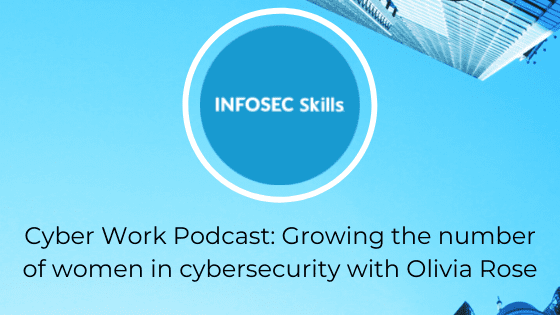Introduction
Cybersecurity is a field on the cutting edge, yet when it comes to gender parity, there’s still much progress to be made. For women, breaking into a male-dominated field like cybersecurity comes with a unique set of challenges.
Data from the (ISC)² Cybersecurity Workforce Report reveals that the landscape of women in cybersecurity is complex and — at least in some ways — evolving:
- Women make up 24% of the cybersecurity workforce — a major increase from 11% in 2017
- Women earn more degrees and cybersecurity certifications on average
- More women than men hold leadership roles like IT Director, CISO and CIO
Seeing these numbers on the rise is exciting and encouraging. However, not all of the statistics are positive:
- Of women in cybersecurity, 56% will leave to pursue jobs in another field
- 17% of women earn salaries between $50,000 and $99,999, compared to 29% of men
- Women in security management roles earn an average of $5,000 less than men in the same roles
In Infosec’s podcast “Growing the Number of Women in Cybersecurity,” Oliva Rose, the director of global executive risk solutions at Kudelski Security, shares her experiences as a woman in the field and shares some valuable advice with women considering a career in the cybersecurity world.
What can companies do to encourage women and minorities to take cybersecurity jobs? And just as important, how can companies encourage them to stay?
Network to overcome isolation
For many women working in cybersecurity, it’s unfortunately easy to feel like a stranger in a strange land. It’s not uncommon to be the only woman on a team or in an entire department, and the feeling of being the “odd woman out” can be enough to drive women to look for jobs in fields with better minority representation.
This leads us to the million-dollar question: what can cybersecurity companies do to make women feel less isolated at work? In this case, the most obvious answer (hire more women) is only one part of the equation, since retention rates for women in cybersecurity are also quite low.
According to Rose, access to networking opportunities is vital. Encouraging women to participate in conferences and professional groups can help them meet other women in the field and foster the sense of community they’ve been missing at work. For women trying to get their foot in the door, Rose suggests volunteering at conferences because it waives the fee! RSA, SecureWorld and ISACA are just a few of the many conferences available to women in information security.
Close the confidence gap
Self-doubt and insecurity can loom over women’s cybersecurity careers like storm clouds on an otherwise sunny day. Many women experience Imposter Syndrome, which is the perception that they’re not as skilled or as smart as their colleagues or that they’re not good enough for the job.
Although men can also experience extreme self-doubt at work, women and minorities are much more susceptible to it. Why? It largely stems from feeling like an outsider. This feeling of being on the outside looking in has ramifications on women’s careers in cybersecurity.
Many women feel the need to prove their skills with certifications and degrees. On average, women in cybersecurity hold more certifications than their male colleagues. They’re also more likely to earn a postgraduate degree, according to the (ISC)² Cybersecurity Workforce Report. Rose has experienced this herself, saying, “You have to know your stuff. You may have to know your stuff more than the five other guys in the room.”
How can we help women feel more confident in cybersecurity jobs? Networking and mentorship are two powerful strategies. Since self-doubt is something that can’t be fought in isolation, connecting women with peers who understand what they’re going through can be immensely beneficial.
Recruit from non-traditional backgrounds
Despite the long-running debate on the value of a college degree in cybersecurity, many recruiters still prefer to hire people with degrees in STEM. That alone disqualifies a huge number of professionals, many of them women, who would make a big contribution to the field.
To hire more women in information security roles, recruiters will have to break the mold and look beyond traditional education requirements. Why? Because women don’t graduate from STEM programs at the same rate as men. In the 2015-2016 school year, women earned only 18.7% of bachelor’s degrees in computer and information sciences..[…] Read more »….


ROLE DESCRIPTION
We are looking for a Membership Manager to join the company and take on one of the most opportunistic roles the industry has to offer. This is a role that allows for you to create and develop relationships with leading solution providers in the enterprise technology space. Through extensive research and conversation you will learn the goals and priorities of IT & IT Security Executives and collaborate with companies that have the solutions they are looking for. This role requires professionalism, drive, desire to learn, enthusiasm, energy and positivity.
Role Requirements:
Role Responsibilities:
Apex offers our team:
Entry level salary with competitive Commission & Bonus opportunities
Apex offers the ability to make a strong impact on our products and growing portfolio.
Three months of hands on training and commitment to teach you the industry and develop invaluable sales and relationship skills.
Opportunity to grow into leadership role and build a team
Extra vacation day for your birthday when it falls on a weekday
All major American holidays off
10 paid vacation days after training period
5 paid sick days
Apply Now >>